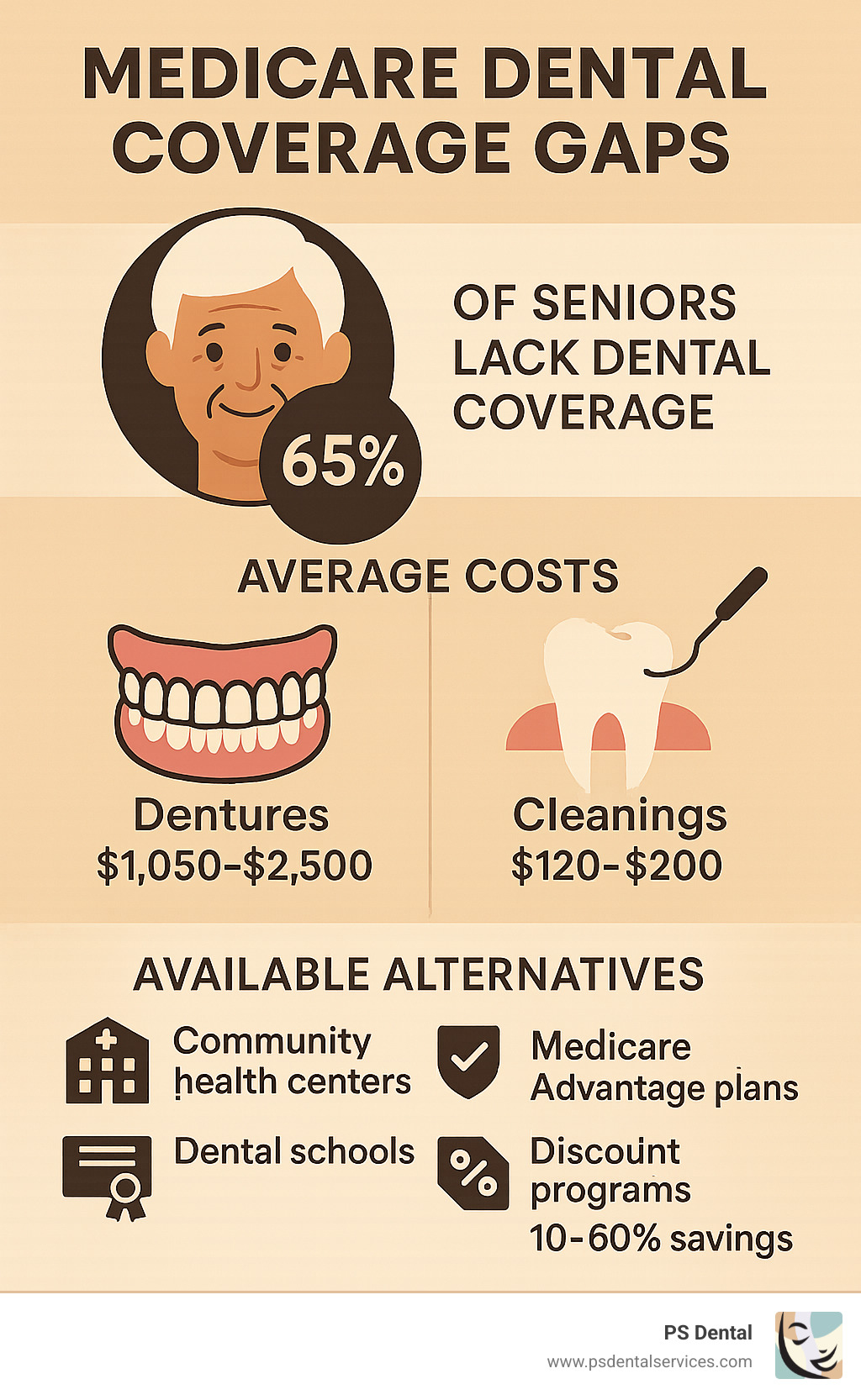Why Dental Care Becomes a Financial Challenge for Seniors
Keeping your smile healthy shouldn’t feel like a luxury item in retirement, yet for many older adults it does. Original Medicare leaves a major gap by excluding routine dental care, so cleanings, fillings, and dentures come straight out of pocket. No surprise then that more than half of seniors skip dental visits because of cost.
What can you do? Start with the resources below—many are either free or deeply discounted and can be combined to drive costs even lower.
• Community health centers with sliding-scale fees
• Dental schools where supervised students treat patients at 50–70 % off
• Medicare Advantage plans that bundle preventive dental
• Dental savings plans (membership discounts of 10–60 %)
• VA dental benefits for eligible veterans
• Senior or cash-pay discounts from local offices
• Non-profits such as Dental Lifeline Network for those who qualify
The stakes are higher than cosmetics. Poor oral health is tied to heart disease, diabetes complications, and malnutrition. Dr. Parisa Sepehri has spent 30 years helping Oregonians find smart, affordable solutions—often by mixing two or three of the options above.
Related content about Affordable dental work for seniors:
Understanding Medicare and Insurance Gaps
If you’re counting on Medicare Parts A & B to clean your teeth, think again. Original Medicare pays nothing toward routine exams, fillings, dentures, or implants. That leaves 65 % of beneficiaries with zero dental coverage and a hefty bill for even basic care. (See Medicare.gov’s dental services page.)
What Medicare Won’t Pay For
• Cleanings and check-ups
• Fillings, crowns, root canals
• Dentures or implants
• Periodontal (gum) therapy
When Medicare Does Help
It steps in only when dental work is tied directly to a covered medical procedure—say, an extraction before heart-valve surgery or treating mouth infections during chemotherapy. Outside of those narrow cases, you’re on your own.
Where Extra Coverage Can Come From
• Medicare Advantage (Part C) plans often include preventive dental and sometimes limited restorative benefits.
• Stand-alone dental insurance runs about $25–$50 per month with annual caps of $1,000–$1,500.
Before choosing, check waiting periods, network rules, and annual maximums so you don’t find limits after you need care.
Affordable Dental Work for Seniors: 9 Smart Options
Below is a quick-hit toolkit you can mix and match to slash dental costs:
- Medicare Advantage or stand-alone insurance
- Dental savings plans and in-house memberships
- Community health centers & sliding-scale clinics
- Dental schools
- VA benefits, PACE, and non-profits
- Cash & senior discounts
- Implant assistance programs
- Payment plans & tax-advantaged accounts
- Smart preventive habits
Details on each appear in the sections that follow or on our affordable dental services page.
1. Medicare Advantage & Stand-Alone Plans
Many Medicare Advantage contracts now toss in cleanings, exams, and sometimes basic fillings. Typical annual maximums are $1,000–$1,500, so they work best for preventive care plus minor fixes. Read the fine print: some plans restrict you to certain dentists, require pre-authorizations, or impose waiting periods for crowns.
If Advantage isn’t right for you, a stand-alone policy may be. Premiums average $25–$50/mo with a small deductible. Plans usually follow the familiar 100-80-50 formula—full coverage for cleanings, 80 % for fillings, 50 % for crowns and dentures—until you hit that annual cap. Ask about missing-tooth clauses if you’re considering dentures or implants.
Either option beats paying everything yourself, but remember: unused benefits don’t roll over, so book those cleanings every six months.
2. Dental Savings Plans & In-House Memberships
Think of a dental savings plan as a Costco membership for your mouth. Pay an annual fee, show your card at participating offices, and immediately save 10–60 % on published fees—no claims, no maximums, no waiting.
Many private practices, including ours in Tigard, now offer in-house memberships covering two cleanings a year plus X-rays, then 10–15 % off any additional work when you pay at time of service. Because there’s no insurer in the middle, treatment decisions stay between you and your dentist.
To compare savings-plan networks or apply for financial help, visit our dental care financial aid resources.
3. Community Health Centers & Sliding-Scale Clinics
Federally Qualified Health Centers (FQHCs) deliver full-service dentistry priced to your income; some seniors pay only a small copay, others nothing at all. Use the HRSA locator tool or dial 1-800-MEDICARE to find sites near you—especially helpful in rural Oregon where choices can be slim.
Quality is solid: licensed dentists handle the work, and many centers accept Medicaid for adults. If you’re on a tight fixed income, start here before postponing care.
4. Dental Schools: High Quality, Low Cost
Student clinics typically charge 50–70 % less than private offices because you’re paying mainly for materials. Every procedure is supervised by licensed faculty, many of whom are specialists. The trade-off? Appointments take longer, and you may need to wait for an opening.
Find a clinic via the American Dental Association’s directory. The process starts with a screening visit to confirm your case fits educational needs, then you’ll be assigned to a student under expert oversight. For retirees with flexible schedules, the savings are well worth the extra chair time.
5. Veterans, PACE & Special-Needs Programs
• VA Dental Care – Benefits vary by disability rating and service connection. Even if you’ve been turned down before, recheck eligibility; rules change and new categories open up.
• PACE (Program of All-Inclusive Care for the Elderly) – For adults 55 + who need nursing-level care but live at home. PACE covers all healthcare, dental included.
• Dental Lifeline Network – Volunteer dentists provide free treatment to seniors who can’t afford care and can’t travel easily.
Each program has paperwork, but the payoff can be thousands in savings.
6. Negotiating Deals: Cash, Senior Days & Travel
Never assume the sticker price is final. Many offices—one Dallas dentist publicly offers 10–15 % off for same-day payment—reward upfront cash because it eliminates billing costs. Compare written estimates from at least two practices and leverage the FAIR Health consumer tool to check regional averages.
Some seniors travel to lower-cost regions for big-ticket work, but weigh airfare, lodging, and follow-up visits. More often, simply shopping around within a 30-mile radius uncovers sizable price swings. Ask about senior-only days or bundling multiple procedures for one reduced fee.
7. Affordable Dental Work for Seniors through Dental Implants Assistance
Implants restore chewing power but often cost $3,000 +. Look at:
• Clinical trials listed by the National Institute of Dental and Craniofacial Research (NIDCR)—sometimes free.
• Charitable grants for low-income seniors (documentation required).
• Dental schools, where supervised students place implants for roughly half the going rate.
• In-house financing at practices like ours in Tigard—spread payments over 12–24 months.
For specifics, visit our affordable dental implants page.
Maximizing Savings & Negotiating Costs
Tax-advantaged accounts—FSAs (up to $3,200 per year) and HSAs—let you pay dental bills with pre-tax dollars. Combine that with a payment plan such as CareCredit (0 % promo periods) and you can break a large invoice into bite-sized chunks.
Use the FAIR Health cost lookup before agreeing to treatment so you know the 80th-percentile fee in your ZIP code. If your dentist’s quote is higher, ask politely why and whether there’s room to adjust.
How to Talk Money With Your Dentist
- Request a written estimate and prioritize urgent fixes first.
- Ask about alternative materials (e.g., porcelain-fused-to-metal instead of all-ceramic).
- Discuss phased treatment so expenses span two insurance years.
- Inquire about 5–15 % cash or senior discounts.
- Confirm lab fees, pre-authorizations, and any warranty on work performed.
Planning prevents surprises—and expensive emergencies later.
Preventive Care & Oral Health Tips
The cheapest dental work is the work you never need. Cleanings run about $120–$200, while a crown can top $1,200. Invest in prevention:
• Brush with fluoride toothpaste twice daily and floss (or use a water flosser) once.
• Stay hydrated and tell your dentist about medications causing dry mouth—over 400 drugs list it as a side effect.
• Limit sugary snacks and sip water instead of soda.
• Schedule check-ups every six months; small cavities are cheap to fix, root canals aren’t.
Need strategies for dry mouth? See this scientific research.
Frequently Asked Questions about Affordable Dental Work for Seniors
Does Medicare ever cover dentures or implants?
Original Medicare doesn’t. A few Medicare Advantage plans or the PACE program might, but coverage and caps vary—read your plan booklet.
What if I can’t afford a dentist right now?
Call 2-1-1 or your local United Way for referrals to low-cost clinics, check FQHCs, and apply to the Dental Lifeline Network. Dental schools are another fast path to reduced fees.
Can dental schools really handle complex work safely?
Yes. Licensed faculty supervise every step, and students can’t advance without meeting strict quality checks. Appointments take longer, but costs fall 50 % or more.
Conclusion
Your smile has carried you through decades—don’t let cost dim it now. From insurance add-ons to community clinics, solutions exist for every budget. The sooner you act, the less you’ll spend later.
Dr. Sepehri and the team at PS Dental Services in Tigard, OR are happy to explain options, create phased treatment plans, and even arrange in-house financing when needed. Call (503) 574-4000 to keep your smile golden without draining your nest egg.
For seniors exploring implants, our affordable dental implants for low-income patients page has the latest assistance programs.
Dr. Parisa Sepehri
Latest posts by Dr. Parisa Sepehri (see all)
- Revolutionizing Tooth Restoration: The Future of Same Day CEREC Crowns - October 3, 2025
- Unlocking the Benefits of Hospital Dentistry: Emergency Care, Anesthesia, and Surgery for Special Needs Patients - October 2, 2025
- Revolutionizing Tooth Restoration: The Power of Same Day CAD/CAM Dental Technology for CEREC Crowns - October 1, 2025
- Unlock the Power of Prevention: The Benefits of Early Cavity Detection with a Family Dentist - September 30, 2025
- Revolutionizing Tooth Restoration: The Future of Same Day CEREC Crowns with CAD/CAM Dental Technology - September 29, 2025







